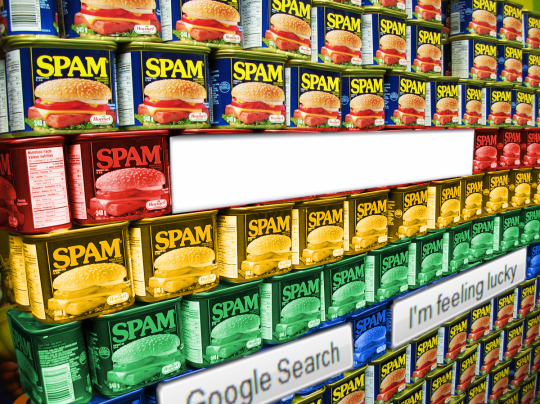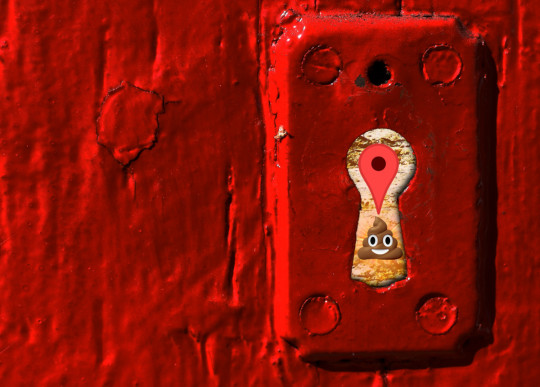#SEo
Text
made some puyo stamps... f2u, no credit needed but appreciated






#puyo puyo#satan#satan puyo puyo#amitie#amitie puyo puyo#arle nadja#seo#seo puyo puyo#roquier#roquier puyo puyo#atari#atari puyo puyo#dark prince#dark prince puyo puyo#stamps#gifs#animated stamps#web graphics#web resources#sal's stamps
22 notes
·
View notes
Text
Like, I'm not saying that this is a good thing, but it's kind of bleakly entertaining how over the course of my life my skill set as an online researcher has gone from being:
Hugely valuable in the late 1990s and early 2000s because the discoverability of information in public-facing databases was fucking terrible and nobody knew how to organise anything; to
Effectively useless throughout the 2010s because search engines enormously and rapidly improved and computer literacy was at an all-time high; and
Back to being hugely valuable once again because SEO bullshit and the proliferation of AI-generated content have degraded online discoverability back to pre-2000 levels and computer literacy is in accelerating decline due to mobile devices deliberately obfuscating basic functionality so that app vendors can sell it back to you with embedded advertising.
25K notes
·
View notes
Text
Google is (still) losing the spam wars to zombie news-brands

I'm touring my new, nationally bestselling novel The Bezzle! Catch me TONIGHT (May 3) in CALGARY, then TOMORROW (May 4) in VANCOUVER, then onto Tartu, Estonia, and beyond!

Even Google admits – grudgingly – that it is losing the spam wars. The explosive proliferation of botshit has supercharged the sleazy "search engine optimization" business, such that results to common queries are 50% Google ads to spam sites, and 50% links to spam sites that tricked Google into a high rank (without paying for an ad):
https://developers.google.com/search/blog/2024/03/core-update-spam-policies#site-reputation
It's nice that Google has finally stopped gaslighting the rest of us with claims that its search was still the same bedrock utility that so many of us relied upon as a key piece of internet infrastructure. This not only feels wildly wrong, it is empirically, provably false:
https://downloads.webis.de/publications/papers/bevendorff_2024a.pdf
Not only that, but we know why Google search sucks. Memos released as part of the DOJ's antitrust case against Google reveal that the company deliberately chose to worsen search quality to increase the number of queries you'd have to make (and the number of ads you'd have to see) to find a decent result:
https://pluralistic.net/2024/04/24/naming-names/#prabhakar-raghavan
Google's antitrust case turns on the idea that the company bought its way to dominance, spending the some of the billions it extracted from advertisers and publishers to buy the default position on every platform, so that no one ever tried another search engine, which meant that no one would invest in another search engine, either.
Google's tacit defense is that its monopoly billions only incidentally fund these kind of anticompetitive deals. Mostly, Google says, it uses its billions to build the greatest search engine, ad platform, mobile OS, etc that the public could dream of. Only a company as big as Google (says Google) can afford to fund the R&D and security to keep its platform useful for the rest of us.
That's the "monopolistic bargain" – let the monopolist become a dictator, and they will be a benevolent dictator. Shriven of "wasteful competition," the monopolist can split their profits with the public by funding public goods and the public interest.
Google has clearly reneged on that bargain. A company experiencing the dramatic security failures and declining quality should be pouring everything it has to righting the ship. Instead, Google repeatedly blew tens of billions of dollars on stock buybacks while doing mass layoffs:
https://pluralistic.net/2024/02/21/im-feeling-unlucky/#not-up-to-the-task
Those layoffs have now reached the company's "core" teams, even as its core services continue to decay:
https://qz.com/google-is-laying-off-hundreds-as-it-moves-core-jobs-abr-1851449528
(Google's antitrust trial was shrouded in secrecy, thanks to the judge's deference to the company's insistence on confidentiality. The case is moving along though, and warrants your continued attention:)
https://www.thebignewsletter.com/p/the-2-trillion-secret-trial-against
Google wormed its way into so many corners of our lives that its enshittification keeps erupting in odd places, like ordering takeout food:
https://pluralistic.net/2023/02/24/passive-income/#swiss-cheese-security
Back in February, Housefresh – a rigorous review site for home air purifiers – published a viral, damning account of how Google had allowed itself to be overrun by spammers who purport to provide reviews of air purifiers, but who do little to no testing and often employ AI chatbots to write automated garbage:
https://housefresh.com/david-vs-digital-goliaths/
In the months since, Housefresh's Gisele Navarro has continued to fight for the survival of her high-quality air purifier review site, and has received many tips from insiders at the spam-farms and Google, all of which she recounts in a followup essay:
https://housefresh.com/how-google-decimated-housefresh/
One of the worst offenders in spam wars is Dotdash Meredith, a content-farm that "publishes" multiple websites that recycle parts of each others' content in order to climb to the top search slots for lucrative product review spots, which can be monetized via affiliate links.
A Dotdash Meredith insider told Navarro that the company uses a tactic called "keyword swarming" to push high-quality independent sites off the top of Google and replace them with its own garbage reviews. When Dotdash Meredith finds an independent site that occupies the top results for a lucrative Google result, they "swarm a smaller site’s foothold on one or two articles by essentially publishing 10 articles [on the topic] and beefing up [Dotdash Meredith sites’] authority."
Dotdash Meredith has keyword swarmed a large number of topics. from air purifiers to slow cookers to posture correctors for back-pain:
https://housefresh.com/wp-content/uploads/2024/05/keyword-swarming-dotdash.jpg
The company isn't shy about this. Its own shareholder communications boast about it. What's more, it has competition.
Take Forbes, an actual news-site, which has a whole shadow-empire of web-pages reviewing products for puppies, dogs, kittens and cats, all of which link to high affiliate-fee-generating pet insurance products. These reviews are not good, but they are treasured by Google's algorithm, which views them as a part of Forbes's legitimate news-publishing operation and lets them draft on Forbes's authority.
This side-hustle for Forbes comes at a cost for the rest of us, though. The reviewers who actually put in the hard work to figure out which pet products are worth your money (and which ones are bad, defective or dangerous) are crowded off the front page of Google and eventually disappear, leaving behind nothing but semi-automated SEO garbage from Forbes:
https://twitter.com/ichbinGisele/status/1642481590524583936
There's a name for this: "site reputation abuse." That's when a site perverts its current – or past – practice of publishing high-quality materials to trick Google into giving the site a high ranking. Think of how Deadspin's private equity grifter owners turned it into a site full of casino affiliate spam:
https://www.404media.co/who-owns-deadspin-now-lineup-publishing/
The same thing happened to the venerable Money magazine:
https://moneygroup.pr/
Money is one of the many sites whose air purifier reviews Google gives preference to, despite the fact that they do no testing. According to Google, Money is also a reliable source of information on reprogramming your garage-door opener, buying a paint-sprayer, etc:
https://money.com/best-paint-sprayer/
All of this is made ten million times worse by AI, which can spray out superficially plausible botshit in superhuman quantities, letting spammers produce thousands of variations on their shitty reviews, flooding the zone with bullshit in classic Steve Bannon style:
https://escapecollective.com/commerce-content-is-breaking-product-reviews/
As Gizmodo, Sports Illustrated and USA Today have learned the hard way, AI can't write factual news pieces. But it can pump out bullshit written for the express purpose of drafting on the good work human journalists have done and tricking Google – the search engine 90% of us rely on – into upranking bullshit at the expense of high-quality information.
A variety of AI service bureaux have popped up to provide AI botshit as a service to news brands. While Navarro doesn't say so, I'm willing to bet that for news bosses, outsourcing your botshit scams to a third party is considered an excellent way of avoiding your journalists' wrath. The biggest botshit-as-a-service company is ASR Group (which also uses the alias Advon Commerce).
Advon claims that its botshit is, in fact, written by humans. But Advon's employees' Linkedin profiles tell a different story, boasting of their mastery of AI tools in the industrial-scale production of botshit:
https://housefresh.com/wp-content/uploads/2024/05/Advon-AI-LinkedIn.jpg
Now, none of this is particularly sophisticated. It doesn't take much discernment to spot when a site is engaged in "site reputation abuse." Presumably, the 12,000 googlers the company fired last year could have been employed to check the top review keyword results manually every couple of days and permaban any site caught cheating this way.
Instead, Google is has announced a change in policy: starting May 5, the company will downrank any site caught engaged in site reputation abuse. However, the company takes a very narrow view of site reputation abuse, limiting punishments to sites that employ third parties to generate or uprank their botshit. Companies that produce their botshit in-house are seemingly not covered by this policy.
As Navarro writes, some sites – like Forbes – have prepared for May 5 by blocking their botshit sections from Google's crawler. This can't be their permanent strategy, though – either they'll have to kill the section or bring it in-house to comply with Google's rules. Bringing things in house isn't that hard: US News and World Report is advertising for an SEO editor who will publish 70-80 posts per month, doubtless each one a masterpiece of high-quality, carefully researched material of great value to Google's users:
https://twitter.com/dannyashton/status/1777408051357585425
As Navarro points out, Google is palpably reluctant to target the largest, best-funded spammers. Its March 2024 update kicked many garbage AI sites out of the index – but only small bottom-feeders, not large, once-respected publications that have been colonized by private equity spam-farmers.
All of this comes at a price, and it's only incidentally paid by legitimate sites like Housefresh. The real price is borne by all of us, who are funneled by the 90%-market-share search engine into "review" sites that push low quality, high-price products. Housefresh's top budget air purifier costs $79. That's hundreds of dollars cheaper than the "budget" pick at other sites, who largely perform no original research.
Google search has a problem. AI botshit is dominating Google's search results, and it's not just in product reviews. Searches for infrastructure code samples are dominated by botshit code generated by Pulumi AI, whose chatbot hallucinates nonexistence AWS features:
https://www.theregister.com/2024/05/01/pulumi_ai_pollution_of_search/
This is hugely consequential: when these "hallucinations" slip through into production code, they create huge vulnerabilities for widespread malicious exploitation:
https://www.theregister.com/2024/03/28/ai_bots_hallucinate_software_packages/
We've put all our eggs in Google's basket, and Google's dropped the basket – but it doesn't matter because they can spend $20b/year bribing Apple to make sure no one ever tries a rival search engine on Ios or Safari:
https://finance.yahoo.com/news/google-payments-apple-reached-20-220947331.html
Google's response – laying off core developers, outsourcing to low-waged territories with weak labor protections and spending billions on stock buybacks – presents a picture of a company that is too big to care:
https://pluralistic.net/2024/04/04/teach-me-how-to-shruggie/#kagi
Google promised us a quid-pro-quo: let them be the single, authoritative portal ("organize the world’s information and make it universally accessible and useful"), and they will earn that spot by being the best search there is:
https://www.ft.com/content/b9eb3180-2a6e-41eb-91fe-2ab5942d4150
But – like the spammers at the top of its search result pages – Google didn't earn its spot at the center of our digital lives.
It cheated.

If you'd like an essay-formatted version of this post to read or share, here's a link to it on pluralistic.net, my surveillance-free, ad-free, tracker-free blog:
https://pluralistic.net/2024/05/03/keyword-swarming/#site-reputation-abuse

Image:
freezelight (modified)
https://commons.wikimedia.org/wiki/File:Spam_wall_-_Flickr_-_freezelight.jpg
CC BY-SA 2.0
https://creativecommons.org/licenses/by-sa/2.0/deed.en
#pluralistic#google#monopoly#housefresh#content mills#sponcon#seo#dotdash meredith#keyword swarming#iac#forbes#forbes advisor#deadspin#money magazine#ad practicioners llc#asr group holdings#sports illustrated#advon#site reputation abuse#the algorithm tm#core update#kagi#ai#botshit
846 notes
·
View notes
Text

divorce selfie!
222 notes
·
View notes
Note
https://www.google.com/
internet opinion on above website
If I search for how to do something, I only find ads for unrelated crap or AI generated nonsense, or occasionally a question posted identical to mine that nobody has ever answered. If I want info on something, I can look for it in quotes and get an ad for something without any words even related to what I was after. The supreme reigning search engine is almost as bad as tumblr's "nothing on this blog" when I just posted and tagged it with the search term earlier that day. The data wars are over. The advertisers won.
Oh wait, this is the FAKE facts blog. Uh... Google's is awesome!
401 notes
·
View notes
Text
Advisory: that recipe for bacon-wrapped whatever that you found on the Internet is a trap. If it's not AI-generated, nine times out of ten somebody took an existing recipe for prosciutto-wrapped whatever and search-and-replaced the word "prosciutto" with "bacon" because the word "bacon" gets better SEO scores. Store-bought bacon is typically too thickly sliced to substitute for prosciutto in most contexts, and what you're going to end up with if you try that recipe is a soggy whatever covered in half-raw bacon.
2K notes
·
View notes
Text
Google reneged on the monopolistic bargain

I'm on tour with my new novel The Bezzle! Catch me TONIGHT in SALT LAKE CITY (Feb 21, Weller Book Works) and TOMORROW in SAN DIEGO (Feb 22, Mysterious Galaxy). After that, it's LA, Seattle, Portland, Phoenix and more!

A funny thing happened on the way to the enshittocene: Google – which astonished the world when it reinvented search, blowing Altavista and Yahoo out of the water with a search tool that seemed magic – suddenly turned into a pile of shit.
Google's search results are terrible. The top of the page is dominated by spam, scams, and ads. A surprising number of those ads are scams. Sometimes, these are high-stakes scams played out by well-resourced adversaries who stand to make a fortune by tricking Google:
https://www.nbcnews.com/tech/tech-news/phone-numbers-airlines-listed-google-directed-scammers-rcna94766
But often these scams are perpetrated by petty grifters who are making a couple bucks at this. These aren't hyper-resourced, sophisticated attackers. They're the SEO equivalent of script kiddies, and they're running circles around Google:
https://pluralistic.net/2023/02/24/passive-income/#swiss-cheese-security
Google search is empirically worsening. The SEO industry spends every hour that god sends trying to figure out how to sleaze their way to the top of the search results, and even if Google defeats 99% of these attempts, the 1% that squeak through end up dominating the results page for any consequential query:
https://downloads.webis.de/publications/papers/bevendorff_2024a.pdf
Google insists that this isn't true, and if it is true, it's not their fault because the bad guys out there are so numerous, dedicated and inventive that Google can't help but be overwhelmed by them:
https://searchengineland.com/is-google-search-getting-worse-389658
It wasn't supposed to be this way. Google has long maintained that its scale is the only thing that keeps us safe from the scammers and spammers who would otherwise overwhelm any lesser-resourced defender. That's why it was so imperative that they pursue such aggressive growth, buying up hundreds of companies and integrating their products with search so that every mobile device, every ad, every video, every website, had one of Google's tendrils in it.
This is the argument that Google's defenders have put forward in their messaging on the long-overdue antitrust case against Google, where we learned that Google is spending $26b/year to make sure you never try another search engine:
https://www.bloomberg.com/news/articles/2023-10-27/google-paid-26-3-billion-to-be-default-search-engine-in-2021
Google, we were told, had achieved such intense scale that the normal laws of commercial and technological physics no longer applied. Take security: it's an iron law that "there is no security in obscurity." A system that is only secure when its adversaries don't understand how it works is not a secure system. As Bruce Schneier says, "anyone can design a security system that they themselves can't break. That doesn't mean it works – just that it works for people stupider than them."
And yet, Google operates one of the world's most consequential security system – The Algorithm (TM) – in total secrecy. We're not allowed to know how Google's ranking system works, what its criteria are, or even when it changes: "If we told you that, the spammers would win."
Well, they kept it a secret, and the spammers won anyway.
A viral post by Housefresh – who review air purifiers – describes how Google's algorithmic failures, which send the worst sites to the top of the heap, have made it impossible for high-quality review sites to compete:
https://housefresh.com/david-vs-digital-goliaths/
You've doubtless encountered these bad review sites. Search for "Best ______ 2024" and the results are a series of near-identical lists, strewn with Amazon affiliate links. Google has endlessly tinkered with its guidelines and algorithmic weights for review sites, and none of it has made a difference. For example, when Google instituted a policy that reviewers should "discuss the benefits and drawbacks of something, based on your own original research," sites that had previously regurgitated the same lists of the same top ten Amazon bestsellers "peppered their pages with references to a ‘rigorous testing process,’ their ‘lab team,’ subject matter experts ‘they collaborated with,’ and complicated methodologies that seem impressive at a cursory look."
But these grandiose claims – like the 67 air purifiers supposedly tested in Better Homes and Gardens's Des Moines lab – result in zero in-depth reviews and no published data. Moreover, these claims to rigorous testing materialized within a few days of Google changing its search ranking and said that high rankings would be reserved for sites that did testing.
Most damning of all is how the Better Homes and Gardens top air purifiers perform in comparison to the – extensively documented – tests performed by Housefresh: "plagued by high-priced and underperforming units, Amazon bestsellers with dubious origins (that also underperform), and even subpar devices from companies that market their products with phrases like ‘the Tesla of air purifiers.’"
One of the top ranked items on BH&G comes from Molekule, a company that filed for bankruptcy after being sued for false advertising. The model BH&G chose was ranked "the worst air purifier tested" by Wirecutter and "not living up to the hype" by Consumer Reports. Either BH&G's rigorous testing process is a fiction that they infused their site with in response to a Google policy change, or BH&G absolutely sucks at rigorous testing.
BH&G's competitors commit the same sins – literally, the exact same sins. Real Simple's reviews list the same photographer and the photos seem to have been taken in the same place. They also list the same person as their "expert." Real Simple has the same corporate parent as BH&G: Dotdash Meredith. As Housefresh shows, there's a lot of Dotdash Meredith review photos that seem to have been taken in the same place, by the same person.
But the competitors of these magazines are no better. Buzzfeed lists 22 air purifiers, including that crapgadget from Molekule. Their "methodology" is to include screenshots of Amazon reviews.
A lot of the top ranked sites for air purifiers are once-great magazines that have been bought and enshittified by private equity giants, like Popular Science, which began as a magazine in 1872 and became a shambling zombie in 2023, after its PE owners North Equity LLC decided its googlejuice was worth more than its integrity and turned it into a metastatic chumbox of shitty affiliate-link SEO-bait. As Housefresh points out, the marketing team that runs PopSci makes a lot of hay out of the 150 years of trust that went into the magazine, but the actual reviews are thin anaecdotes, unbacked by even the pretense of empiricism (oh, and they loooove Molekule).
Some of the biggest, most powerful, most trusted publications in the world have a side-hustle in quietly producing SEO-friendly "10 Best ___________ of 2024" lists: Rolling Stone, Forbes, US News and Report, CNN, New York Magazine, CNN, CNET, Tom's Guide, and more.
Google literally has one job: to detect this kind of thing and crush it. The deal we made with Google was, "You monopolize search and use your monopoly rents to ensure that we never, ever try another search engine. In return, you will somehow distinguish between low-effort, useless nonsense and good information. You promised us that if you got to be the unelected, permanent overlord of all information access, you would 'organize the world's information and make it universally accessible and useful.'"
They broke the deal.
Companies like CNET used to do real, rigorous product reviews. As Housefresh points out, CNET once bought an entire smart home and used it to test products. Then Red Ventures bought CNET and bet that they could sell the house, switch to vibes-based reviewing, and that Google wouldn't even notice. They were right.
https://www.cnet.com/home/smart-home/welcome-to-the-cnet-smart-home/
Google downranks sites that spend money and time on reviews like Housefresh and GearLab, and crams botshittened content mills like BH&G into our eyeballs instead.
In 1558, Thomas Gresham coined (ahem) Gresham's Law: "Bad money drives out good." When counterfeit money circulates in the economy, anyone who gets a dodgy coin spends it as quickly as they can, because the longer you hold it, the greater the likelihood that someone will detect the fraud and the coin will become worthless. Run this system long enough and all the money in circulation is funny money.
An internet run by Google has its own Gresham's Law: bad sites drive out good. It's not just that BH&G can "test" products at a fraction of the cost of Housefresh – through the simple expedient of doing inadequate tests or no tests at all – so they can put a lot more content up that Housefresh. But that alone wouldn't let them drive Housefresh off the front page of Google's search results. For that, BH&G has to mobilize some of their savings from the no test/bad test lab to do real rigorous science: science in defeating Google's security-through-obscurity system, which lets them command the front page despite publishing worse-than-useless nonsense.
Google has lost the spam wars. In response to the plague of botshit clogging Google search results, the company has invested in…making more botshit:
https://pluralistic.net/2023/02/16/tweedledumber/#easily-spooked
Last year, Google did a $70b stock buyback. They also laid off 12,000 staffers (whose salaries could have been funded for 27 years by that stock buyback). They just laid off thousands more employees.
That wasn't the deal. The deal was that Google would get a monopoly, and they would spend their monopoly rents to be so good that you could just click "I'm feeling lucky" and be teleported to the very best response to your query. A company that can't figure out the difference between a scam like Better Homes and Gardens and a rigorous review site like Housefresh should be pouring every spare dime it brings in into fixing this problem. Not buying default search status on every platform so that we never try another search engine: they should be fixing their shit.
When Google admits that it's losing the war to these kack-handed spam-farmers, that's frustrating. When they light $26b/year on fire making sure you don't ever get to try anything else, that's very frustrating. When they vaporize seventy billion dollars on financial engineering and shoot one in ten engineers, that's outrageous.
Google's scale has transcended the laws of business physics: they can sell an ever-degrading product and command an ever-greater share of our economy, even as their incompetence dooms any decent, honest venture to obscurity while providing fertile ground – and endless temptation – for scammers.

If you'd like an essay-formatted version of this post to read or share, here's a link to it on pluralistic.net, my surveillance-free, ad-free, tracker-free blog:
https://pluralistic.net/2024/02/21/im-feeling-unlucky/#not-up-to-the-task
#pluralistic#monopoly#seo#dark seo#google#search#enshittification#platform decay#product reviews#spam#antitrust#trustbusting
712 notes
·
View notes
Text



~Sweet Dreams~
Pairing: Bf Binnie x !female reader
warnings: somnophilia (consensual), unproducted sex, porn with very little plot
synopsis: binnie can't resist you when he comes home late and you're already sleeping. You just look too good...
♡♡♡♡♡♡♡♡♡♡
author's note: no one asked for this. this is purely self indulgent. thank you all for humoring me.
Changbin had just stepped out of the shower. His hair was messy, covering his eyes, curls and waves everywhere. He lazily attempted to fix it, while the towel around his waist began to loosen. His body aches from work. These late nights were starting to catch up with him. He made his way to the bed where you were already sleeping. You had tried in earnest to wait up for him. Drinking an extra cup of coffee and playing loud music to fight the tired feeling. But there you slept, the bed sheets halfway up your body. A tank top and shorts the only thing covering you.
Your mouth was open and snores were steadily leaving your mouth. Your hair was meshed around the pillow. It wasn't pretty like in the movies. If you could see yourself right now you'd be so embarrassed but Binnie just stared in amazement. To him, you looked like a goddamn supermodel. The curves of your body were gliding and cascading perfectly on the bed. He could feel himself growing harder under the towel. Swelling at the sight of you.
You both had talked about the possibility. Binnie slipping inside you one night. It made you hot, the thought of it. Peacefully resting while he thrusts into. Rutting into you without any kind of control.
Binnie slowly climbed on top of you. Carefully straddling you, his thick thighs on either side of you. Your body stirred slightly. Your mouth closed and your brows furrowed from the movement. Binnie moved the hair from your face then caressed your cheek. He smiled at the sight of you. You looked so beautiful like this. Like an angel.
He travelled his hand from your cheek down your neck to your beasts. Your chest lifted at the slight touch. Your nipples already hard. Binnie's other hand gripping his cock, longingly stroking. Two fingers pinch your nipples and tug lightly. Your breath hitches and your eyes flutter for a moment but you continue to sleep. Binnie continues to rub and pull on your nipples, his other hand picking up speed, angry beads of precum surfacing. He pulled down your shorts to reveal a thin string of arousal already forming for him.
"good girl..." He whispered. He was incredibly hard now. Painfully erect. He lifted your legs carefully. He watched your face methodically, cautious to stop at any sign of discomfort. He wanted this to be good for you. You were his angel, his bunny.
He slid in slowly at first. Unbearably slow. He groaned at the pace. God how he loved the feeling of you covering him completely. To watch his cock disappear inside of your tight cunt. You were made for him. He bucked his hips into you and bottomed out, pausing for a moment. You kept your eyes closed, seemingly unphased. Binnie slid back out then in again, this time a little more quickly. You swallowed him up perfectly. Your cunt squeezing and pulsating around his length.
"bunny? Are you awake..?" Binnie whispered between thrusts. Grunting rhythmically on top of you. You continued sleeping. Your head turned to the side, your eyebrows furrowing again. He wondered for a moment if you were dreaming about him. About his cock thrusting and slamming inside of you. The bed shaking and the mattress bouncing beneath the two of you.
Binnie was close now. So fucking close. He scanned the bedroom for somewhere to finish. An old T-shirt? A sock? Nothing was in reach. Just then something grabbed his wrist. It was your hand.
"Come inside of me, binnie baby, please." Your eyes were glossy. Your mouth open and head bouncing to the feeling of his thrusts. He was a wreck now. He was a mess. Absolutely no strength left. He let everything go when you asked him. When you were so sweet and polite asking for him to fill you, to make you his, to claim you.
"I'm yours, Daddy. I'm yours" you chanted like a prayer as he emptied inside of you. You threw your head back and closed your eyes to feel every drop of it. Your legs begin to shake and Binnie holds them tighter. You left your body go limp. He drops down next to you. One arm still slung across your chest.
"I love you so much." He confesses through batted breath. His face was turned towards yours. Both of you fuxked out with a big, dumb smile plastered on both of your faces. This was not going to be the last time you fell asleep waiting for Changbin to come home.
#stray kids#skz smut#stray kids smut#writing#changbin#seo#seo changbin#changbin x you#changbin x reader#changbin imagines#changbin bias#somno breeding#somno fantasy#skz smut drabble#skz fanfic
255 notes
·
View notes
Text

❤️❤️
#trans#spooky season#transgurl#loki series#trans man#trans nsft#sexy pose#sexy content#transformation#transgirl#seo#trans artist#mtf trans#transgender#trans rights#transfem#transsexual#r
331 notes
·
View notes
Text
I suppose the thin silver lining to the discoverability of online resources going to shit because of SEO explotation is that all the folks who responded to reasonable questions with snarky "let me Google that for you" links which now lead to nothing but AI-generated gibberish look like real assholes now.
941 notes
·
View notes
Note
-Size training with chan and changbin, them being so big and buff got me feeling some kinda way. Just imagining dom! chan benig so nice and soft while you try to fit him down your throat. MehAps anal? slowly working your way up to bigger sized dildos until you're ready for either one of their cocks? Just reader being small and them forcing their dick into you- so basically big dick energy with both of them- ok thank youuu <333
This ask has me all sorts of messed up! Anon I am so thankful for you.
Okay I wasn't sure how to break this down, so I am going to do both boys separately than Poly!
Chan would be so caring and sweet when size training you. I feel like it all started from the first time you two were getting intimate. It ended early because you couldn't take him all the way, he was just too big. While he had a short-lived ego boost, he saw the pain in your eyes and immediately stopped. After a long discussion about insecurities and wants, you two decided to size train. He bought a bunch of toys in varying sizes but never bigger than himself. You two had a schedule set for when you would begin stretching. I picture him sitting against the headboard with you sat in-between his legs. He would slowly draw circles on your clit and ease in the toy, only praises left his mouth. Chan was concerned when you said you were ready to try him again but was completely impressed when he was able to sink right in. While he may still be praising you... his movements were punishing.
Changbin would see size training as a sort of exercise. He likes to push the limits of his body through working out and when he saw you struggling to deep throat him, he got a wicked smile on his face. It was a regimented routine he had set up for you. Every time you would go down on him for training, he would set up reps. Half his dick in your mouth for 10 seconds, pull back for 5, then repeat. After each "work out" Binnie would take such good care of you. Just like muscle training, you needed to rest and respect your body. That way when your neck session came, he could push you just a bit more. You didn't even realize until after he finished that you managed to let his fuck your throat like a doll.
Now the two of them together would be so hot. I think the two of them would size train you for anal. They both get so jealous of who gets to ruin you, so why not at the same time. They bought the cutest set of plugs with different gem colors to represent sizes. Depending on the day, one of the boys would lay your naked body over their lap while the other spread you open and nestled in the plug. It was always loving touches and sweet words. Once it was secured, they made sure you came at least twice. one from each of them. They were getting ready to set up for you next plug when they noticed one was missing...the largest size. When they found you sat all pretty in bed with a glimmering pink plug, the two boys lost it. Now it was a competition of who got to use it first.
#stray kids#skz#stray kids smut#skz smut#sweetie of the bakery#bang chan#bang chan x reader#bang chan smut#chang#changbin smut#changbin x reader#seo#seo changbin
440 notes
·
View notes
Text
You can’t shop your way out of a monopoly

I'm on tour with my new, nationally bestselling novel The Bezzle! Catch me in TUCSON (Mar 9-10), then SAN FRANCISCO (Mar 13), Anaheim, and more!

If you're running a business, you can either invest at being good at your business, or good at Google SEO. Choose the former and your customers will love you – but they won't be able to find you, thanks to the people who choose the latter. And if you're going to invest in top-notch SEO, why bother investing in quality at all?
For more than a decade, Google has promised that it would do something about "lead gens" – services that spoof Google into thinking that they are local businesses, pushing down legit firms on both regular search and Google Maps (these downranked businesses invested in quality, not SEO, remember). Search for a roofer, a plumber, an electrician, or a locksmith (especially a locksmith), and most or all of the results will be lead-gens. They'll take your call, pretend to be a local business, and then call up some half-qualified bozo to come out and charge you four times the going rate for substandard work:
https://www.nytimes.com/2016/01/31/business/fake-online-locksmiths-may-be-out-to-pick-your-pocket-too.html
Some of them just take your money and they "go back to the shop for a tool" and never return:
https://www.riverfronttimes.com/news/when-a-fake-business-used-a-real-st-louis-address-things-got-weird-32087998
Google has been promising to fix this since the late aughts, and to be fair, it's a little better. There was once a time when a map of Manhattan showed more locksmiths than taxis:
https://blumenthals.com/blog/2009/02/18/google-maps-proves-more-locksmiths-in-nyc-than-cabs/
But GMaps is trapped in the enshittification squeeze. On the one hand, the company wants to provide a good and reliable map. On the other hand, the company makes money selling "ads" that are actually payola, where a business can pay to get to the top of the listings or get displayed on the map itself. Zoom out of Google's map of central London and the highlighted landmarks are a hilarious mix of "organic" and paid listings: the British Museum, Buckingham Palace, the Barbican, the London Eye…and a random oral and maxillofacial clinic in the financial district:
https://twitter.com/dylanbeattie/status/1764711667663831455
Hell of a job "organizing the world's information and making it universally accessible and useful," Big G. Doubtless the average Londoner finds the presence of this clinic super helpful in orienting themselves relative to the map on their phone screens, and it's a real service to tourists hoping to hit all the major landmarks.
It's not just Maps users who'd noticed the rampant enshittification. Even the original design team is so horrified they're moved to speak out about the moral injury they experience seeing the product they worked so hard on turned into a giant pile of shit:
https://twitter.com/elizlaraki/status/1727351922254852182
Now, when it comes to locksmiths, I'm lucky. My neighborhood in Burbank includes the wonderful Golden State Lock and Safe, which has been in business since 1942:
https://www.goldenstatelock.com/
But you wouldn't know it from searching GMaps for a locksmith near me. That search turns up a long list of scams:
https://www.google.com/maps/search/locksmith/@34.1750451,-118.369948,14z/data=!3m1!4b1?entry=ttu
It also turns up plenty of Keyme machines – these are private-equity backed, self-serve key-cutting machines placed in grocery stores. Despite Keyme calling itself a "locksmith," it's just a badly secured, overcaptilized, enshittification-bound system for collecting and retaining shapefiles for the keys to millions of homes, cross-referenced with billing information that will make it easy for the eventual hackers to mass-produce keys for all those poor suckers' houses.
(Hilariously, Keyme claims to be an "AI" company):
https://www.businesswire.com/news/home/20200114005194/en/KeyMe-Raises-35-Million-to-Further-Its-Mission-of-Building-the-Premier-Locksmith-Services-Company-in-the-Nation
But despite the fact that you can literally see the Golden State storefront from Google Streetview, Google Maps claims to have no knowledge of it. Instead, Streetview labels Golden State "Keyme" – and displays a preview showing a locksmith using a tool to break into a jeep (I'd dearly love to know how the gadget next to the Slurpee machine at the 7-Eleven will drive itself to your jeep and unlock the door for you when you lose your keys):
https://www.google.com/maps/place/KeyMe+Locksmiths/@34.1752624,-118.3487531,3a,75y,350.19h,90.21t/data=!3m6!1e1!3m4!1ssHrtqjqvgFir3NBauMy13Q!2e0!7i16384!8i8192!4m15!1m8!3m7!1s0x80c2959cd65dbb1b:0x4b3744cf87492a71!2sBurbank+Blvd+%26+N+Hollywood+Way,+Burbank,+CA+91505!3b1!8m2!3d34.1750025!4d-118.3493484!16s%2Fg%2F11f37_3lq8!3m5!1s0x80c2951cedbf4d39:0xe8ff9fd5872e66e9!8m2!3d34.1755176!4d-118.349!16s%2Fg%2F11mw7nr4fx?entry=ttu
It's pretty clear to me what's going on here. Keyme has hired some SEO creeps and/or paid off Google, flooding the zone with listings for its machines. Meanwhile, Golden State, being merely good at locksmithing, has lost the SEO wars. Perhaps Golden State could shift some of its emphasis from being good at locksmithing in order to get better at SEO, but this is a race that will always be won by the firm that puts the most into SEO, which will always be the firm that puts the least into quality.
Whenever I write about this stuff, people inevitably ask me which search engine they should use, if not Google?
And there's the rub.
Google used predatory pricing and anticompetitive mergers to acquire a 90% search market-share. The company spends more than $26b/year buying default position in every place where you might possibly encounter a new search engine. This created the "kill zone" – the VC's term of art for businesses that no one will invest in, because Google makes sure that no one will ever find out it exists:
https://www.theverge.com/23802382/search-engine-google-neeva-android
That's why the only serious competitor to Google is Bing, another Big Tech company (Bing is also the primary source of results on Duckduckgo, which is why DDG sometimes makes exceptions for Microsoft's privacy-invading tracking):
https://en.wikipedia.org/wiki/DuckDuckGo#Controversies
Google tells us that the quid-pro-quo of search monopolization is search excellence. The hundreds of billions it makes every year through monopoly control gives it the resources it needs to fight spammers and maintain search result quality. Anyone who's paid attention recently knows that this is bullshit: Google search quality is in free-fall, across all its products:
https://downloads.webis.de/publications/papers/bevendorff_2024a.pdf
But Google doesn't seem to think it has a problem. Rather than devoting all its available resources to fighting botshit, spam and scams, the company set $80 billion dollars alight last year with a stock buyback that was swiftly followed with 12,000 layoffs, followed by multiple subsequent rounds of layoffs:
https://pluralistic.net/2024/02/21/im-feeling-unlucky/#not-up-to-the-task
The scams that slip through Google's cracks are sometimes nefarious, but just as often they're decidedly amateurish, the kind of thing that Google could fix by throwing money at the problem, say, to validate that new ads for confirmed Google merchants come from the merchant's registered email addresses and go to the merchant's registered website:
https://pluralistic.net/2023/02/24/passive-income/#swiss-cheese-security
Search is a capital intensive business, and there are real returns to scale, as the UK Competition and Market Authority's excellent 2020 study describes:
https://assets.publishing.service.gov.uk/media/5fe4957c8fa8f56aeff87c12/Appendix_I_-_search_quality_v.3_WEB_.pdf
But Google doesn't seem to think that its search needs that $80 billion to fight the spamwars. That's the thing about monopolists, they get complacent. As Lily Tomlin's "Ernestine the AT&T operator" used to say, "We don't care, we don't have to, we're the phone company."
That's why I'm so excited about the DOJ Antitrust Division monopolization case against Google. Trusting one company to "organize the world's information and make it universally accessible and useful," was a failure:
https://www.justice.gov/opa/pr/justice-department-sues-google-monopolizing-digital-advertising-technologies
I understand why people want to know which search engine they should use instead of Google, and I get why, "There aren't any good search engines" is such an unsatisfactory answer. I understand why each fresh round of printer-company fuckery prompts people to ask "which printer should I get?" and I understand why "There are only six major printer companies and they're all suffering from end-stage enshittification" isn't what anyone wants to hear.
We want to be able to vote with our wallets, because it's so much faster and more convenient than voting with our ballots. But the vote-with-your-wallet election is rigged for the people with the thickest wallets. Try as hard as you'd like, you just can't shop your way out of a monopoly – that's like trying to recycle your way out of the climate emergency. Systemic problems need systemic solutions – not individual ones.
That's why the new antitrust matters so much. The answer to monopolies is to break up companies, block and unwind mergers, ban deceptive and unfair conduct. "Caveat emptor" is the scammer's motto. You shouldn't have to be an expert on lead gen scams to hire a locksmith without getting ripped off.
There are good products and services out there. Earlier this year, we decided to install a (non-networked) programmable pushbutton lock. I asked Deviant Ollam – whom I know from Defcon's Lockpicking Village – for a recommendation and he suggested the Schlage FE595:
https://www.schlage.com/en/home/products/FE595PLYFFFFLA.html
I liked it so much I bought another one for my office door. Eric from Golden State Lock and Safe installed it while I wrote this blog-post. It's great. I recommend both of 'em – 10/10, would do business again.

Name your price for 18 of my DRM-free ebooks and support the Electronic Frontier Foundation with the Humble Cory Doctorow Bundle.

If you'd like an essay-formatted version of this post to read or share, here's a link to it on pluralistic.net, my surveillance-free, ad-free, tracker-free blog:
https://pluralistic.net/2024/03/05/the-map-is-not-the-territory/#vapor-locksmith

Image:
alicia rae (modified)
https://commons.wikimedia.org/wiki/File:Kehole_Red.jpg
CC BY 2.0
https://creativecommons.org/licenses/by-sa/2.0/deed.en
--
Budhiargomiko (modified)
https://commons.wikimedia.org/wiki/File:Wasteland.jpg
CC BY-SA 4.0
https://creativecommons.org/licenses/by-sa/4.0/deed.en
240 notes
·
View notes